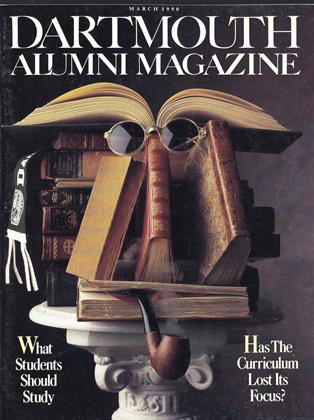WHILE IN TOWN for the Princeton game last fall, Shepard Stone stopped by the Magazine office for a conversation about the fastmoving events overseas. This was before the fall of Ceausescu, the indictment of Honecher, even before the Berlin Wall came down. Yet Shep's analysis still seems very current.
Dartmouth Alumni Magazine: With democratic movements sweeping the communists from power in eastern Europe, has NATO become a white elephant?
Shepard Stone: No. These new developments show the success of the military alliance in the postwar years.
Can you see a united Germany in the near future?
Of course one can see it, but I think this is old-fashioned thinking, it's a mistake to believe that West Germany is just waiting to take over East Germany. West Germans do want their eastern relatives to have more freedom 35 percent or so of the people in East Germany have relatives in West Berlin. On the other hand, the West Germans are an integral part of the western system. And they're not about to give that up. I think West Germany would be willing to put a lot of money into helping to develop industry, the environment, social security, and all the rest in East Germany so people would stay there. And if you had borders such as you have with Austria and Hungary, why not? The old days of the Bismarckian empire are gone.
What does this all mean for the Warsaw Pact?
Well, the question is whether the Warsaw Pact has ever had any of the real strength of NATO. Many people over the last 40 years have said, if the Warsaw Pact ever came into a war, how much could the Russians rely, really, on their Polish, Hungarian, and even East German allies? I don't think that was ever a situation in the West. Among my many acquaintances in Moscow and eastern Europe, that was always a question.
But you still see a need, don't you, for the defense of western Europe?
Oh yes. We should continue the western alliance, but really purely on a defensive basis. It may not be necessary to have so many nuclear weapons, so many troops in Germany. I think pulling down the levels will help us all. In Germany today there are still 400,000 American, British, French, Dutch, and Belgian troops packed into an area the size of Wyoming. And you have the biggest concentration of nuclear weapons in the world. I believe there can be advances in the Geneva and Vienna negotiations for arms control, so some of these forces can be pulled back. But the basic concept of the alliance is the only way to go.
Those forces are expensive nonetheless. Can you see a combined Europe begin to bear its own financial burden?
Well, you know, it probably could do more. But there's so much mythology about it. There are many of our people in Washington who know that, if you pulled certain American troops out of Germany and wanted to keep them in the United States, we'd probably spend more than we do in Germany. After all, the Germans are covering a tremendous cost there.
Even with the massed armies, you still see a new Europe.
Oh, it's amazing. When I think back on VE day, and the desolation, the despondancy, and the contempt people had for the Germans, and to see this thriving new Europe and it's been only 40, 50 years. Go on an airplane between Frankfurt and Paris and it's full of young French, German, and other young entrepreneurs all inconceivable 40 or 50 years ago. There's a new spirit. There are going to be many problems just as we had them in the development of our own country. But it's an inevitable process, and I think that with enlightened Statesmanship on our part a combined Europe will be of great benefit to us, too.
Combined in more ways than one. It is supposed to come together as an economic and political entity in 1992, but there are already signs of squabbling. Will we ever see a fully united Europe?
Ninety-two has become sort of a magic figure. It doesn't have to be '92 it may be '93, or '94, or '95. But it's not only feasible the countries are working definitely in that direction. There are problems with a united Europe, just as you have in this country among the states. Here in New England we complain about environmental dangers that come from the Midwest, while the midwestern states say they can't afford to put in the chimneys and the scrubbers so that New England will have an even more beautiful environment. The nations of Europe have that kind of problem with each other. But let there be no doubt: Europe is moving toward a common market and a common Europe.
What should the United States do to prepare for that moment?
I think we should greet it. Our great companies today are a part of the Common Market. I think some of them make their biggest profits in Europe and not in the United States. These corporations greet it.
The United States should not try to fight the inevitable, which is the development of Europe. The English and the French certainly didn't like the development of the United States earlier in our history, but we did develop. We should work together.
 View Full Issue
View Full Issue
More From This Issue
-
 Cover Story
Cover StoryDartmouth's Steady Course
March 1990 By James Wright -
 Feature
FeatureA Hero to Europe
March 1990 -
 Feature
FeatureADDICTED TO CONVERSATION
March 1990 By Clayton G. Gates '90 -
 Feature
FeatureANCIENT PAGE TURNERS
March 1990 By JONI COLE AND LEE MICHAELIDES -
 Feature
FeatureThe Purpose Gap
March 1990 -
 Feature
FeatureAn Elegant Backwater
March 1990 By Clayton G. Gates '90







